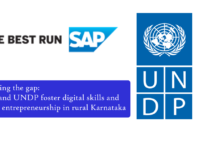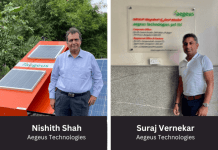Smart Power India (SPI), a subsidiary of the Rockefeller Foundation, partnered with GiveIndia Foundation, Swasth Foundation, Eka Care to provide COVID relief, in the rural community, primarily to their mini grid customers and ESCO employees. The services include:
● Meeting oxygen supply via oxygen cylinders and concentrators for the COVID patients
● Facilitating in-person and telemedicine consultations for those with chronic conditions
● Procuring and distributing PPE to health professionals and essential workers and others
The mini grid villages in India have observed an intense health crisis in 2021 as compared to 2020. As per the recent surveys conducted by SPI across mini-grid villages, 77% participants expressed COVID care facilities are inaccessible in case of emergency. Last year the main concern for rural households was livelihood. This year it is about access to healthcare. Lack of awareness and COVID appropriate behaviour still exists in the rural community with half the participants surveyed believing that their communities aren’t taking preventive measures like masking and sanitizing.
Commenting on the partnership, Jaideep Mukherji, CEO, Smart Power India, said, “Last year we focussed on providing livelihood support to the rural community. This year, we see an urgent need to address the issue of lack of access to quality medical services. Health and safety of our mini grid customers and ESCO employees are some of our immediate priorities. These partnerships aim to support our ailing health infrastructure.”
SPI had launched a Customer Voucher Scheme (CVS) for mini-grid customers in 2020. It aimed to benefit over 125,000 lives in 200 mini-grid villages in the wake of the COVID-19 pandemic. CVS enabled the mini-grid customers to redeem the vouchers against their monthly electricity bill issued by Mini-Grid Operators (MGO) for a period of 3 months. The scheme is believed to impact over 125,000 lives in 200 mini-grid villages. This year, SPI is in the process of planning such health related incentives to ease the health care burden in the catchment areas.
Contribution details:
| NGO | Financial and Technical Support for services such as: |
| Give India | 1) Setting up oxygen generation plants 2) Providing oxygen concentrators 3) Providing oxygen cylinders 4) Refilling oxygen cylinders 5) Providing Bipaps (Non-invasive ventilation) 6) Providing Ventilators |
| Swasth Foundation | 1) Providing dry ration kits to families that live in the surrounding slum areas of Mumbai 2) Facilitating in-person and telemedicine consultations for those with chronic conditions for the urban poor in Mumbai 3) Procuring and distributing PPE to health professionals and essential workers |
| Eka Care | 1) Introducing the Eka Care application in rural India so that masses are able to receive free, timely and competent medical advice from reputable doctors without having to take the risk of leaving their houses. 2) Development of the application, including ❖ Translating the application to Hindi and other regional languages ❖ Enrolling more doctors to comfortably reach more people ❖ Improving navigability through feedback from SPI customers 3) Creating awareness, in the following ways ❖ Social media campaign to highlight the positive impact of the application ❖ Dissemination of application amongst SPI’s ESCO partners’ 30,000+ customers and directly & indirectly reach over 2,50,000 people ❖ Awareness generation on application usage |
About Smart Power India (SPI)
SPI, a subsidiary of the Rockefeller Foundation, was established in 2015 to develop and scale sustainable models to accelerate electricity access and spur economic development amongst the rural underserved communities. It is committed to create knowledge and accountability in the public domain through robust evidence-based research and provide field and analytical support to the Government, private sector, implementers and other donors in their pursuits for rural electricity access. SPI develops and disseminates relevant knowledge in the rural electricity access and services space with an aim to promote research and innovation and partners with policymakers, practitioners and academic institutions to come up with actionable insights and innovative strategies. While SPI’s work covers the spectrum of supply and demand side issues of rural electricity, its focus is the last-mile customer. SPI exchanges knowledge by promoting and facilitating platforms for networking, knowledge sharing and collaborative research, networking, knowledge sharing and collaborative research.
















































